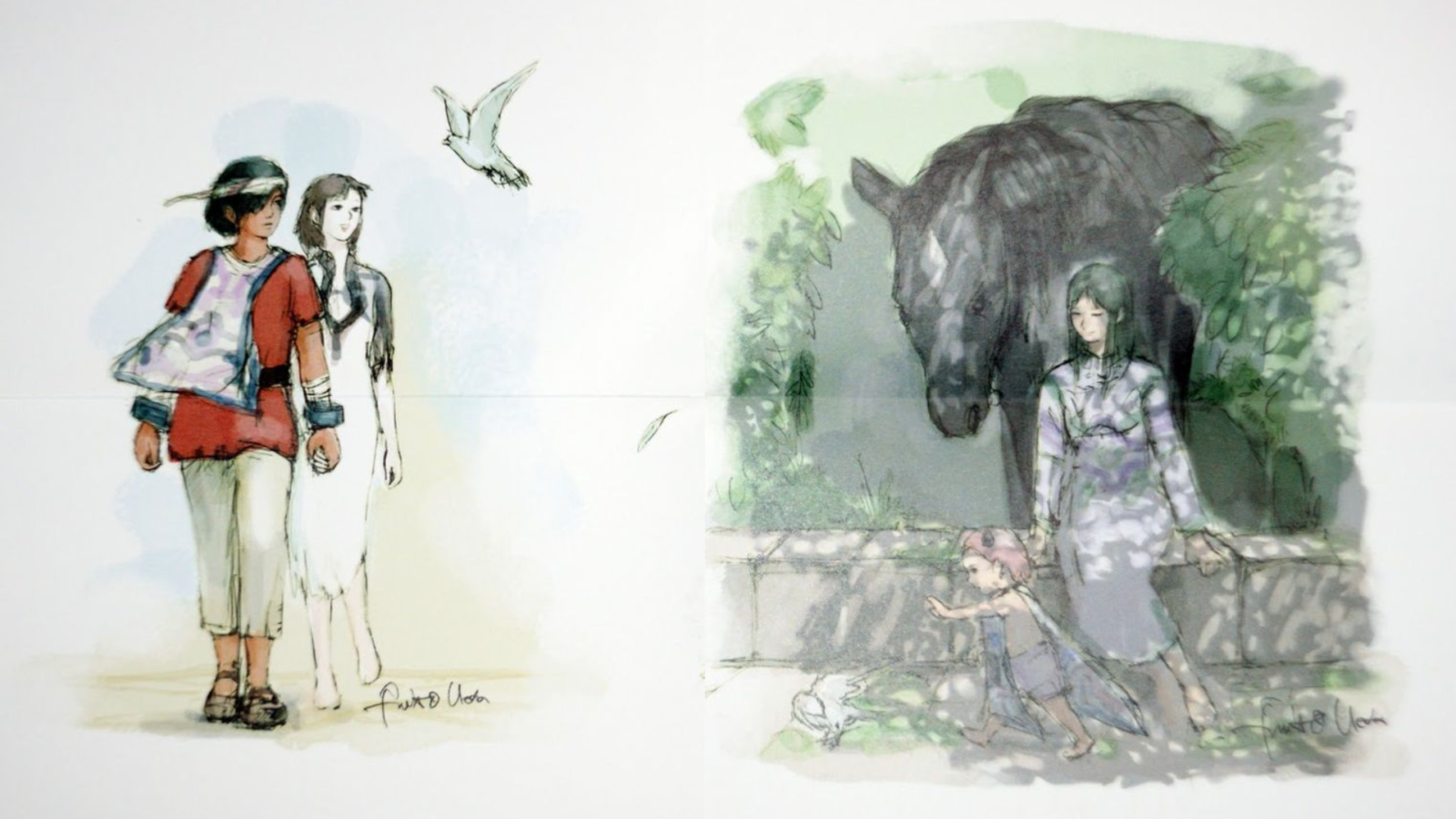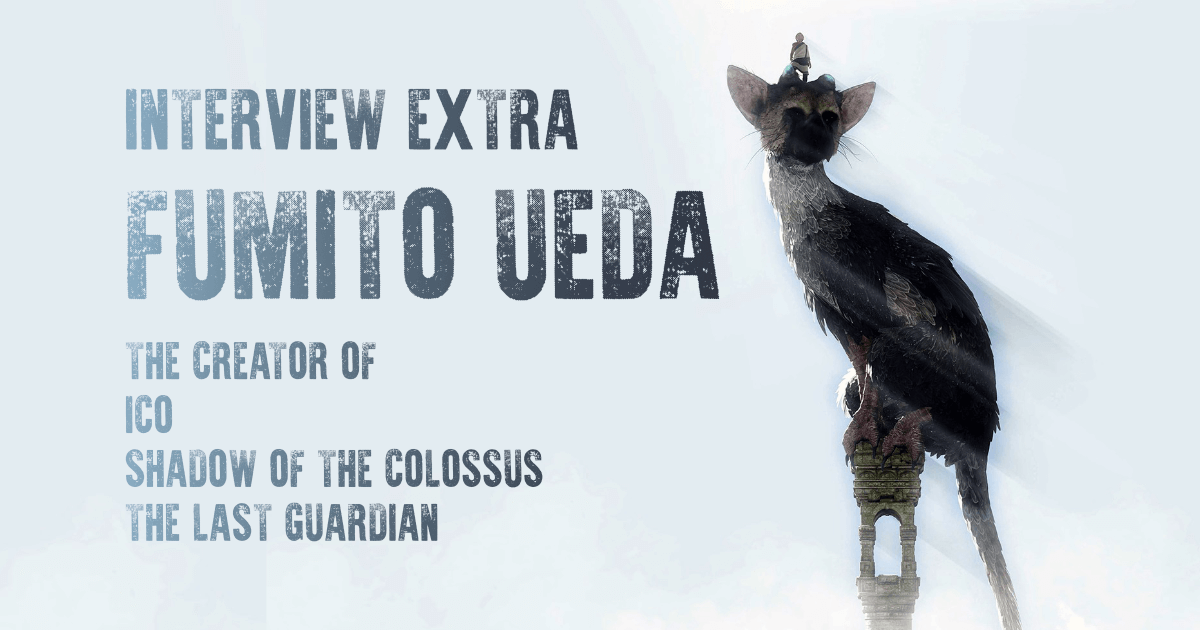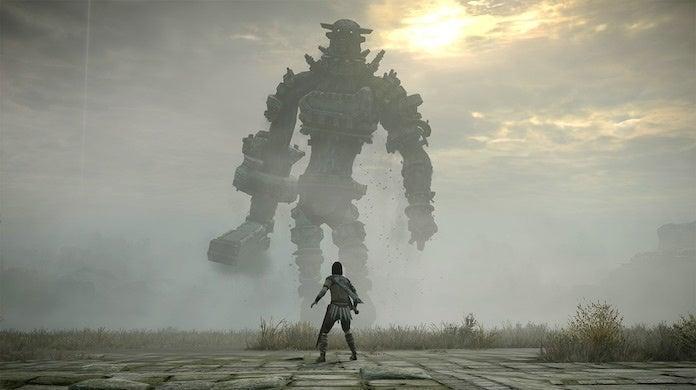sublimit
Banned

Your games always stand out to me as being very philosophically-driven. Are there any specific works of literature or thinkers that you could name as some of your primary inspirations?
For example, I feel like Shadow of the Colossus is deeply influenced by Taoist values about respecting the beauty and inherent balance of nature, as well as serving as a cautionary tale of the dangers of man overstepping his boundaries. My interpretation of The Last Guardian on the other hand is very much centered around Aristotle’s views on friendship. Are these the kind of themes you considered during the writing process?
Fumito Ueda: This is my personal opinion, but I don’t really get conceptions based on based on expression media like films and novels upon making a videogame.
Even if I had some kind of (themed or philosophical) images in mind, I wouldn’t cling onto them and rather value the consistency and harmony that are inevitably generated through the game design process itself.
This is because I feel that clinging onto a theme is far too inefficient when making a videogame.
If videogame production was to be compared to writing, my thoughts is that it’s closer to looking for words to fit in the squares of a crossword puzzle rather than crafting sentences with whatever words you like onto a fresh sheet of manuscript paper, hence it is still far from reaching the degree of freedom of expression that novels and films have creation-wise.
In this respect, I think I’m the type of creator with a designer’s perspective rather than that of an author.
If you could collaborate on a game project with another person – alive or dead – from any other medium, be it a writer, film director, painter or musician who would it be?
Fumito Ueda: Although there are many film directors, writers and creators I look up to, it is hard to think of anyone I could collaborate with on a game project in particular.
Because making videogames is more “design” than “creation”-oriented than compared with other creative expression mediums, as it involves very different production processes to the creation of films, novels, etc., so I wouldn’t feel that easy to lightheartedly invite whoever for a collaboration.
Do you ever have ideas for stories in media other than videogames, like books, or a graphic novel, or something else?
Fumito Ueda: I rarely get conceptions on the basis of a story when making videogames, but I always have a conscious desire to have a story that is appropriate particularly for a videogame.
While a story is being generated, there could be occasions that make me think, “Could this be a kind of story more suitable for another medium than a videogame?” but it ends up rather mediocre. This is because it is difficult to represent stories with too complex a structure in a game, so the stories in videogames tend to become rather straightforward, and they mostly feel too simple to be applied to anything else outside of videogames.
I was so impressed and inspired to hear that you had an art background but soon became the leader of your own, original game IP. This is something of a dream of mine but this kind of thing just doesn’t seem to happen in the western world.
So I would like to ask you if you believe that the trust placed in more art-focused directors, rather than, say, marketers, programmers, or business people, is a characteristic specific to the Japanese game design/development culture? Do you feel that the professional (AAA) scene in Japan is more open, or mature, than in the west when it comes to creating original games?
Fumito Ueda: The situation is the same in Japan with regard to the AAA scene. Not only for AAA titles but in general, I have the impression that there are rather more art-focused games in the Western countries.
Also, every time I go abroad on a business trip, I feel that the level of understanding for art and the respect for creative work is higher in the West than in Japan.
This trend feels stronger with videogames in particular (compared with films, novels and music).
We have “manga” in Japan, and manga are generally created by artists as individuals. Given that the manga market is large as well, perhaps creation by individual creators is more common in Japan than in other countries.
I adore the sense of your worlds feeling like there was once a thriving, sophisticated civilisation that had fallen into ruin, and I spent hours traveling around both and piecing together my own theoretical narrative about what that might have once looked like. Was there much thought given to those ruined areas and did you conceive a backstory for it at the conceptual phase?
Fumito Ueda: The worlds I have created were generated out of restrictions.
Although they of course contain some preferences of me as the creator, they were generated out of the necessity for functionality reasons rather than backstory settings etc.
By this way of creating, I think the world created can be expressed with consistency and harmony, which will increase a sense of existence of the world expressed like that.
Rather than something sumptuous but with no sense of existence, I believe something cheap yet having a sense of existence would make the world feel more authentic.
What I’m always conscious of is that it should be expressed in a suggestive way with consistency.
Shadow of the Colossus is the only game I can think of that I’ve considered stopping playing because of how shameful I felt playing the main character in it. There are games where I’ve disliked the themes, gore or characters and gave up, but no others that questioned my motives and actions. I even spent ages trying to progress in the game without resorting to killing the colossi. But eventually I realised I had to slay yet another beautiful beast.
Was the overall aim of SOTC to question why it is that most games are about killing and how we have grown so comfortable doing so in a virtual existence?
Fumito Ueda: I play games where violence is a factor myself, so I do not dismiss such games.
However, through the production of Shadow of the Colossus, I started having doubts about simply “feeling good by beating monsters” and “getting a sense of accomplishment”. I tried thinking if there were any other choices for different kinds of expression, then ended up with such settings and rules as a result.
Rather than try to deliberately create some sort of antithesis, I focused more on the consistency of the design as a product and differentiation (from other products).
As a side note, when I first showed my staff the sequence of sad-sounding music being played after defeating a colossus in “Shadow of the Colossus”, they thought it was a bug and laughed because they were so used to games that would play a fanfare after defeating a monster.
The protagonists in Ico, SotC, and The Last Guardian are all to some extent young, slight, vulnerable, and inelegant. Personally, I love how they contrast against typically more empowering protagonists and accentuate the grand scale of the games they’re in. What it is about this type of character that appeals to you? And what other types of protagonists would you be interested in portraying in the future?
Fumito Ueda: The characters are meant to help players feel the game design more effectively, and the character design is done for this purpose.
The main reason for this is to clarify the allocation of roles for the characters within the game world, and I believe that it is what “character design” is all about.
Secondly, I’d say that I wanted the protagonists to have some kind of vulnerability that players could empathise with rather than to be immaculately perfect protagonists.
With The Last Guardian, do you feel you accomplished the full extent of what can be done with AI Companions at that time? Are there additional things you wish could have made Trico even more alive?
Fumito Ueda: Yes, there are a lot of such things. The Trico we were creating on PlayStation 3 actually had more motion patterns than the PS4 version did, but we were unable to transfer everything due to transition time issues.
What I personally would have wished to do the most was an online update of Trico’s AI. I had ideas such as Trico offering a hint in a stage where the puzzle is difficult, and Trico changing little by little through the interaction with players who have completed the game, but these ideas could not be implemented also due to the transferring time issue.
Each of your titles features complex architecture, and all of them fall apart to some degree at the end. Why is that? Do you see your work as having themes of destruction? Is it necessary for growth?
Fumito Ueda: I have worked on my titles so far with the desire to make a game with a proper “end”.
Rather than making a game that binds the players to the game world and is infinitely playable, I believe it is important to take them back to the real world (everyday life) after a certain length of time when it comes to creative entertainment, particularly for creations with narrativity.
Hence I chose destruction as one of the ways to let the players feel the solid end.
Shadow of the Colossus was at one point rumoured to be a co-op game – is it possible to tell as effective a story if the game is multiplayer?
Fumito Ueda: Indeed, the initial idea was to boldly challenge a gigantic monster in a group and beat it.
For multiplayer, the creator is unable to control the storytelling as precisely as in single player, and even if tried, it would likely end up half-baked, so I suppose I would have then aimed for a narrative expression with higher level of randomness.
With the creation of genDESIGN and the decision to collaborate with Kowloon Knights to bring your next title to life, was there a need to try and do things differently to how your games have been created in the past? If so, does taking a different approach to the business side of things also influence you to take a different approach to the creation of your next project?
Fumito Ueda: Up until the last title, I had been making a game while presuming the complete form of the game in my head. In fact, it would only become a playable game after the development went into its middle stage.
In videogame making, you will never know exactly if it is what you imagined, if it’s interesting, etc., until you actually get it work as a game and enable yourself to touch its features.
However, we have now become able to quickly (in a simplified way) attempt game ideas thanks to the popularisation of game engines and game editors, and that’s the biggest change we’ve had.

Interview Extra: Fumito Ueda (Ico, Shadow of the Colossus, The Last Guardian)
We put a selection of questions to Fumito Ueda, the acclaimed creator behind the celebrated games Ico, Shadow of the Colossus and The Last Guardian.
 caneandrinse.com
caneandrinse.com

